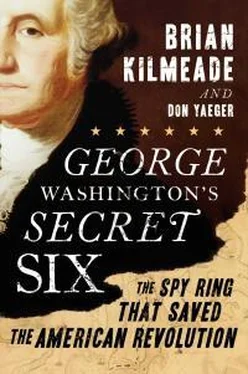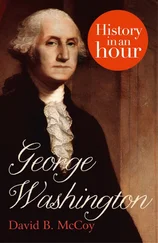For those well-to-do Loyalists who stayed in the city because it was their home, the general squalor was of little concern; there was still a sparkling social scene full of dinner parties and balls, providing a glittering mask of denial. After all, such was urban life, and New York was certainly large enough to absorb whatever elements came its way. The British officers stationed there enjoyed the high life, only occasionally interrupted by the necessary evil of having to earn their pay by leading troops into battle. When the tents were struck and the cannon smoke cleared, they went back to living it up in the ballrooms, coffeehouses, and taverns of Manhattan.
The common foot soldiers stationed there were hardly enjoying the same privileges as their commissioned leadership, but they, too, had the benefits of steady pay and the automatic authority conferred by their uniforms. Life for civilians who were less well-off was harder, as they competed for what resources were left over after the troops were supplied.
For those Patriots who remained behind when the American troops withdrew, life became a kind of fragile maze; it could be successfully navigated if one trod carefully, but a wrong turn or false move could leave one isolated and alone, and a single errant step could cause an irreparable crack. The physical fighting between armies had subsided, but that did not mean peace had filled the vacuum.
Yet despite the disease, stink, vice, and every other undesirable trait with which the city was plagued, New York was still the most desirable piece of real estate on the North American continent. As the geographical heart of the English eastern seaboard, it was strategically significant from both a naval and an economic perspective. And it was still solidly outside of General Washington’s grasp—but not out of reach of Abraham Woodhull. Whether or not he was transporting goods back and forth between Manhattan and Long Island without official British sanction was, by his own estimation, no one’s business but his own. After all, it was his neck on the line if he was caught.
SMUGGLING
Woodhull was infinitely practical and took pride in his pragmatism. What use did a farmer have for frivolity? Unlike a merchant, whose profitability hinged on the art of accurately reading and predicting the social whims of the spending public, a farmer depended on the hard science of nature for his livelihood. But sometimes those worlds intersected—a farmer with a shrewd business sense could capitalize on the tastes and trends of the general population by trading his produce for luxury goods that he could sell for a hefty profit while never having to indulge in the trappings of fashionability himself. What could be more practical than that?
Urbane, bustling New York imported exotic and high-end merchandise from around the globe; such trade was the basis of much of its economy. But its cobblestone streets and tightly packed homes and businesses left little earth for gardens, let alone large-scale farming. And yet the population needed to eat. North of the city, working farms dotted the Hudson Valley, but those areas were largely in Patriot hands. British soldiers closely monitored every road in and out of Manhattan, and farmers who brought in wagons of meats, grains, cheeses, and vegetables for sale in the city were likely to face taxes or even confiscation of part of their goods. Still, it was good business, even if some losses had to be factored in as part of the game.
The farmers and fishermen on Long Island devised ways to get around the British taxes. Some took the ferry that ran between Brooklyn and Manhattan, carrying bundles of food disguised as ordinary goods of little interest to the authorities; others found their own means of transport. One or two men could cross the Sound due west to largely Patriot Connecticut, then travel by foot or else row south to Manhattan with a well-stocked whaleboat. After quickly and easily unloading their goods at high prices to city residents hungry for fresh, wholesome produce, they would fill the skiff up with tea, spices, foreign wines, and trinkets not available on Long Island that they could buy cheaply in the city. Some of these capitalists traded for their own gratification (or that of their families); others, like Woodhull, found they could sell the goods at exaggerated prices to the isolated and luxury-starved residents of Long Island. It was a simple case of supply and demand. Luxury goods were wanted and Woodhull was happy to supply them—in return for silver.
But it was also risky business. The Sound was patrolled by the formidable British navy and, even though smuggling was accepted as common practice, an example was sometimes made of violators. Men who were caught could face anything from a stern warning to a heavy fine to imprisonment. Those who were not caught could expect to live rather comfortably.
Woodhull found himself favoring the lower-risk route of the Brooklyn ferry as he once again began making his regular trips from his home in Setauket to visit his sister Mary and her husband, Amos Underhill, at their Manhattan boardinghouse. This family connection gave him a warm meal and a roof over his head for the night, possibly a built-in clientele (if not among boarders then among neighbors) for his smuggled goods, and, most important, a plausible reason to be headed for the city with regularity. New York was not in a state of siege, and private citizens could travel with some degree of freedom, but regulations were certainly tightened and the occupying army was always on the lookout for suspicious activity that might belie smuggling or even espionage. Of the former, Woodhull was certainly guilty; he had little thought of the latter yet.
Woodhull held his political cards close to the vest; he knew what happened to the families of outspoken dissenters. Even if he chafed under a sense of inherited obligation, he still felt the weight of responsibility to care for his aging parents and his sister Susannah. He quickly squelched any burgeoning sense of Patriotic duty that tried to take root in his mind or in his heart. He couldn’t leave to join the army, even if his personality had been better suited for military service. Not with both of his brothers now dead.
No, his place was in Setauket, even if it meant having to endure the inconvenience of the redcoats’ watchful eyes on all trade and commerce.
ISLAND LIFE
While New Yorkers were facing their own uncertain future, their friends and relations across the Sound were finding their lives even more disrupted. The soaring population, crime, and demand on resources may not have been anything new to Manhattan residents, but for Long Islanders, it was quite a change from their idyllic existence prior to the war.
In the second half of the eighteenth century, Long Island was still largely rural and wooded, with the town green in front of the church often the only open area for acres in any direction, save for a few cleared patches for crops and pasturelands. Even the shorelines were dense with trees. Combined with the rugged topography of the land itself, that meant sweeping vistas of the sea were not nearly as common as boggy inlets that overlooked more forests or were situated at the foot of small, hilly farms. Fresh produce, meats, cheese, milk, and eggs from these small estates all fetched high prices in the city, though the trade was tightly regulated by the British.
The farmers were supposed to be fairly compensated for whatever goods were procured for the occupying soldiers, but this was not always the case. Instead of cash, locals were often given promissory notes that later proved worthless; sometimes boisterous troops simply helped themselves to a farmer’s livestock or orchard, or to a tavern keeper’s ale. Even more concerning was the wanton disregard for land rights. The British disassembled fences and barns for the sake of lumber, which cost the owner time and money for repair and replacement and also threatened the future viability of the farm by allowing animals to get loose or exposing plowing equipment to the elements. If the landowner objected to being so grossly misused by the British, he was told to take his complaints to the officer in charge. Disciplinary measures and restitution were never guaranteed—consequences varied according to the moral character of the presiding officer.
Читать дальше












